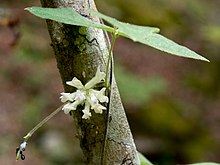Amphicarpaea bracteata
| Hog-peanut | |
|---|---|

| |
| Inflorescence | |
| Scientific classification | |
| Kingdom: | Plantae |
| Clade: | Tracheophytes |
| Clade: | Angiosperms |
| Clade: | Eudicots |
| Clade: | Rosids |
| Order: | Fabales |
| Family: | Fabaceae |
| Subfamily: | Faboideae |
| Genus: | Amphicarpaea |
| Species: | A. bracteata
|
| Binomial name | |
| Amphicarpaea bracteata (L.) Fernald
| |
| Synonyms[1] | |
|
l | |
Amphicarpaea bracteata (hog-peanut or ground bean) is an annual to perennial vine in the legume family, native to woodland, thickets, and moist slopes in eastern North America.[2]
Description
[edit]Leaves have three leaflets and are held alternately on twining stems.
Flowers are pink to white and bloom from late summer to autumn. The flowers are either open for cross-pollination or closed and self-pollinating. The closed flowers may be above or below ground.[3]
Seeds from open flowers are held in a flat pod, pointed at both ends, that dries when mature and twists to release the seeds. Seeds from closed flowers are held in round pods with a single seed each. The roots and the cooked seeds from under the ground are edible.[4][5] The seeds which become subterranean from flowers on stolons give it the name hog peanut.[6]
Location
[edit]This plant can be found in eastern North America, as well as further west into the Midwestern region, including Indiana,[6] Illinois,[6] and Wisconsin.[7]
References
[edit]- ^ "Amphicarpaea bracteata (L.) Fernald". International Legume Database & Information Service – via The Plant List. Note that this website has been superseded by World Flora Online
- ^ USDA, NRCS (n.d.). "Amphicarpaea bracteata". The PLANTS Database (plants.usda.gov). Greensboro, North Carolina: National Plant Data Team.
- ^ Trapp, E. Joseph; Hendrix, Stephen D. (March 1988), "Consequences of a mixed reproductive system in the hog peanut, Amphicarpaea bracteata, (Fabaceae)", Oecologia, 75 (2): 285–290, Bibcode:1988Oecol..75..285J, doi:10.1007/BF00378611, ISSN 1432-1939, PMID 28310848, S2CID 7629519
- ^ "Amphicarpaea bracteata". Plants for a Future.
- ^ Niering, William A.; Olmstead, Nancy C. (1985) [1979]. The Audubon Society Field Guide to North American Wildflowers, Eastern Region. Knopf. p. 520. ISBN 0-394-50432-1.
- ^ a b c Hilty, John (2020). "Hog Peanut (Amphicarpaea bracteata)". Illinois Wildflowers. "Hog Peanut (Amphicarpaea bracteata)". Archived from the original on 2019-08-26. Retrieved 2022-11-16.
{{cite web}}: CS1 maint: bot: original URL status unknown (link) - ^ Flora of Wisconsin, Wisconsin State Herbarium, University of Wisconsin–Madison
External links
[edit]- "Amphicarpaea bracteata". Plants for a Future.
- Native Plant Database profile, Lady Bird Johnson Wildflower Center, University of Texas at Austin
- Connecticut Plants, Connecticut Botanical Society
- Amphicarpaea bracteata in the CalPhotos photo database, University of California, Berkeley
- Missouri Plants Archived 2018-10-04 at the Wayback Machine
